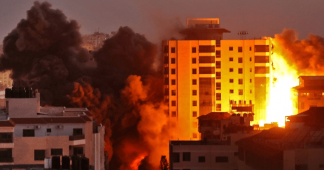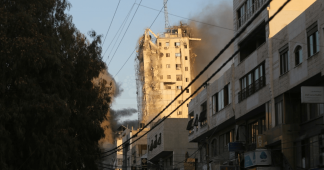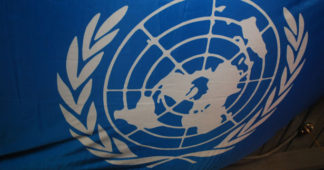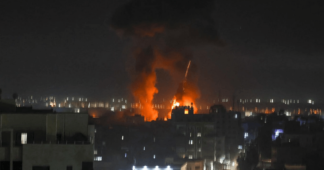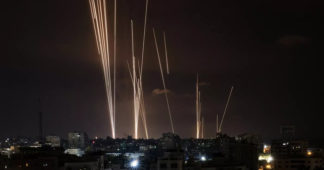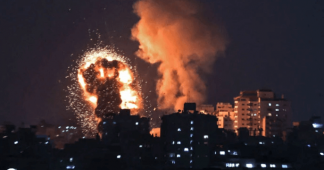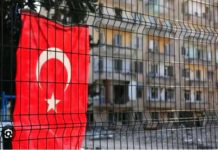Western states have provided cover for Israel’s lawless extremism and possible end goal of massive dispossession and ethnic cleansing of the Palestinian people
By Richard Falk
24 October 2023
In the avalanche of emotionally fraught commentary on the 7 October attack by Palestinian fighters against Israel and the subsequent Israeli assault on Gaza, media and political leaders appear to have forgotten that from the perspective of international law, Gaza remains an occupied territory subject to the Fourth Geneva Convention (Geneva IV).
Although Israel unilaterally proclaimed its “disengagement” from Gaza in 2005 – withdrawing its troops, dismantling 21 settlements and ejecting 8,000 settlers (somewhat offset by giving each unlawful settler family hundreds of thousands of dollars in compensation) – this did not end Israel’s obligations under international law.
The United Nations Human Rights Council has drawn this conclusion on the basis that Israel’s disengagement did not end the existential realities of Israeli control over Gaza, nor did it allow the territory to enjoy the benefits of autonomous political development.
Rather, the process involved an intrusive redeployment of occupying military and police forces on Gaza’s borders, including total control over the entry and exit of Palestinians and goods at border crossings, as well as continuing exclusive dominance over Gaza’s air and sea space.
This post-2005 structure of occupation was reinforced by frequent Israeli incursions, including targeted assassinations of Hamas political and military officials, frightening sonic booms of overflying Israeli fighter jets, and major military operations in 2008-09, 2012, 2014 and 2021, during which Israel committed many war crimes.
In addition, since 2007, a harsh and punitive blockade has left the impoverished population of Gaza facing the world’s highest unemployment rate and a collective experience of life-threatening economic decline.
Israel’s record of criminality towards Gaza was most notably documented in the UN’s 2009 Goldstone report, whose policy recommendations were left unimplemented due to political pressures exerted on Israel’s behalf.
This typical experience of condemning Israel’s policies and practices, but taking no proposed preventive or punitive action in response, has been repeated over and over again, which explains Palestinian disillusionment with the UN and international law.
Disproportionate response
The question of Gaza’s legal status is extremely relevant to the indiscriminate and disproportionate Israeli retaliation, which has been justified by Israel and its supporters as exacting vengeance while pursuing the goal of destroying Hamas.
The 7 October Palestinian fighters’ operation inside Israel, accounting for more than 1,400 Israeli deaths and the capture of around 200 hostages, was itself a distinct war crime.
Neither the Palestinian fighters’ attack nor Israel’s response are free from the restraints of law and morality. In the simplest terms, the crimes committed do not give legal impunity to retaliatory Israeli war crimes.
The central point thus far lost in the public discourse is this: just as the Palestinian armed factions had no authority to commit war crimes because they were intensely provoked by decades of Israeli criminal actions, nor does Israel have the authority to act outside the constraints of law when retaliating.
The proper international framing of the relationship between Israel and Hamas – despite being crucial to interpreting the legal, moral and political issues at stake – has been revealingly absent from most media treatments and the policy postures of influential western political leaders.
Israel has used the most inflammatory and expansive language to vindicate its retaliatory responses. This lawless Israeli extremism has been blandly endorsed by governments in the US, France, Germany and the UK. Such pronouncements neglect to mention the obligation of the occupying power to administer the territories under its control in ways that give priority to the protection and wellbeing of the occupied civilian population. The occupier does enjoy a reciprocal right to maintain its security in ways that respect and protect non-combatants.
From such a perspective, it is conceptually misleading and normatively unacceptable for Israel to declare war against an occupied territory, as if the indigenous administrative authority was an enemy foreign government – but this is exactly what Israel has done, including claims of self-defence that do not fit the situation of belligerent occupation.
Genocidal siege
Israel has declared a total war on Gaza, imposing a genocidal siege that has cut off supplies of food, electricity and fuel, making no provision whatsoever to exempt civilians – most of whom have no direct contact with the military activities of Hamas.
Article 55 of Geneva IV sets forth the duty of Israel as occupying power to ensure that the people living in the territory it “occupies” have adequate food, water and medicines. But Israel’s indiscriminate retaliation has included repeated nighttime aerial bombardments of residential areas, alongside the forbidden targeting of hospitals, schools and UN buildings, where many Palestinians have sought shelter under these extraordinary conditions.
A 24-hour evacuation order directed at 1.1 million Palestinians living in northern Gaza, without the provision of reasonable time to arrange such a dangerous departure from long-term places of residence, was aggravated by the lack of a safe and habitable place for Palestinians to go, thus intensifying the dangers facing civilians in Gaza – and their suffering. Such a measure amounts to extreme collective punishment, which is prohibited by Article 33 of Geneva IV. It has less to do with security than with driving Palestinians out of Gaza, thereby implementing the end-game visions of Israel’s extremist coalition government.
It is relevant to note that Michael Lynk, the UN’s special rapporteur for Palestine, submitted a detailed report to the agency on why Israel’s authority as occupying power should be terminated, given its failure to comply with applicable international human rights law.
This recommendation was ignored by the UN, but the General Assembly was sufficiently distressed by Israel’s pattern of behaviour in occupied Palestine that it requested an advisory opinion from the International Court of Justice on the continuing legality of Israel’s status as an occupying power within the framework of Geneva IV. The case is currently under consideration by the court.
If the West continues to endorse the double standards on display during the humanitarian catastrophe unfolding in Gaza, it will serve as a reminder that the post-colonial world retains an ethos of Orientalist racism when it comes to addressing issues of peace and justice in the Middle East.
By failing to advocate for a ceasefire, western states have given a green light to Israel’s agenda of collective punishment, which might itself be grotesque cover for the regime’s end goal of massive dispossession and ethnic cleansing of the Palestinian people.
We remind our readers that publication of articles on our site does not mean that we agree with what is written. Our policy is to publish anything which we consider of interest, so as to assist our readers in forming their opinions. Sometimes we even publish articles with which we totally disagree, since we believe it is important for our readers to be informed on as wide a spectrum of views as possible.
